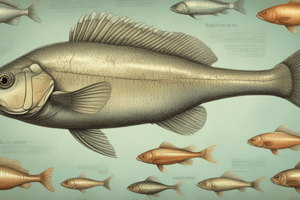Podcast
Questions and Answers
What percentage of global fish species are considered freshwater species?
What percentage of global fish species are considered freshwater species?
- 25%
- 50%
- 41% (correct)
- 60%
Which freshwater fish family includes salmon and trout?
Which freshwater fish family includes salmon and trout?
- Catostomidae
- Salmonidae (correct)
- Cyprinidae
- Cichlidae
What is the primary reason many freshwater fish species are threatened or endangered?
What is the primary reason many freshwater fish species are threatened or endangered?
- Dams and pollution (correct)
- High reproductive rates
- Migration patterns
- Natural disasters
Which region is known for having the highest diversity of freshwater fish species?
Which region is known for having the highest diversity of freshwater fish species?
What defines an endemic fish species?
What defines an endemic fish species?
Flashcards are hidden until you start studying
Study Notes
Freshwater Fish: Species Diversity
-
Definition: Freshwater fish are species that live and reproduce in freshwater environments such as rivers, lakes, ponds, and streams.
-
Global Diversity:
- Approximately 15,000 species of fish exist globally, with about 41% being freshwater species.
- Major families include:
- Cyprinidae (carps and minnows)
- Cichlidae (cichlids)
- Salmonidae (salmon and trout)
- Catostomidae (suckers)
-
Key Regions:
- Amazon Basin: Home to the highest diversity of freshwater fish, with over 2,000 species.
- Great Lakes: A significant number of endemic species in North America.
- African Great Lakes: Notably Lake Tanganyika and Lake Malawi, rich in cichlid diversity.
-
Categories of Freshwater Fish:
- Native Species: Fish that originated and evolved in a specific freshwater habitat.
- Introduced Species: Non-native species that have been intentionally or accidentally introduced to freshwater systems.
- Endemic Species: Fish species that are unique to a specific location and cannot be found naturally elsewhere.
-
Adaptations:
- Freshwater fish have unique adaptations such as:
- Specialized osmoregulatory mechanisms to manage salt concentration.
- Various body shapes and sizes adapted for specific habitats (e.g., slim bodies for fast currents).
- Freshwater fish have unique adaptations such as:
-
Conservation Status:
- Many freshwater fish species are threatened or endangered due to:
- Habitat destruction (dams, pollution).
- Overfishing.
- Invasive species competition.
- Many freshwater fish species are threatened or endangered due to:
-
Ecological Importance:
- Serve as indicators of environmental health.
- Play critical roles in food webs, both as predators and prey.
- Many species are crucial for local economies (fishing and tourism).
-
Research Trends:
- Increasing focus on biodiversity assessments and conservation strategies.
- Genetic studies to understand species development and relationships.
- Monitoring the impacts of climate change on freshwater ecosystems.
### Freshwater Fish Diversity
- Approximately 41% of all fish species globally are freshwater fish.
- There are about 15,000 species of fish worldwide.
- Major families include: Cyprinidae, Cichlidae, Salmonidae, and Catostomidae.
- The Amazon Basin is home to over 2,000 freshwater fish species, the highest diversity globally.
- The Great Lakes are a significant habitat for endemic species in North America.
- The African Great Lakes, particularly Lake Tanganyika and Lake Malawi, have a high diversity of cichlid fish.
- Native species are adapted to specific freshwater habitats.
- Introduced species are non-native and can negatively impact native populations.
- Endemic species are found only in a specific location.
- Freshwater fish have adaptations for osmoregulation to manage salt balance in their environment.
- Body shapes and sizes vary in fish to suit their habitats.
- Many freshwater fish species are facing threats due to habitat destruction, overfishing, and invasive species.
- Freshwater fish are indicators of the health of their ecosystems.
- They play key roles in food webs as both predators and prey.
- Many freshwater fish are vital for local economies, supporting fishing and tourism industries.
- Research focuses on biodiversity assessments, conservation strategies, genetic studies, and understanding climate change impacts on freshwater systems.
Studying That Suits You
Use AI to generate personalized quizzes and flashcards to suit your learning preferences.




